SUMMARY
This is AI generated summarization, which may have errors. For context, always refer to the full article.
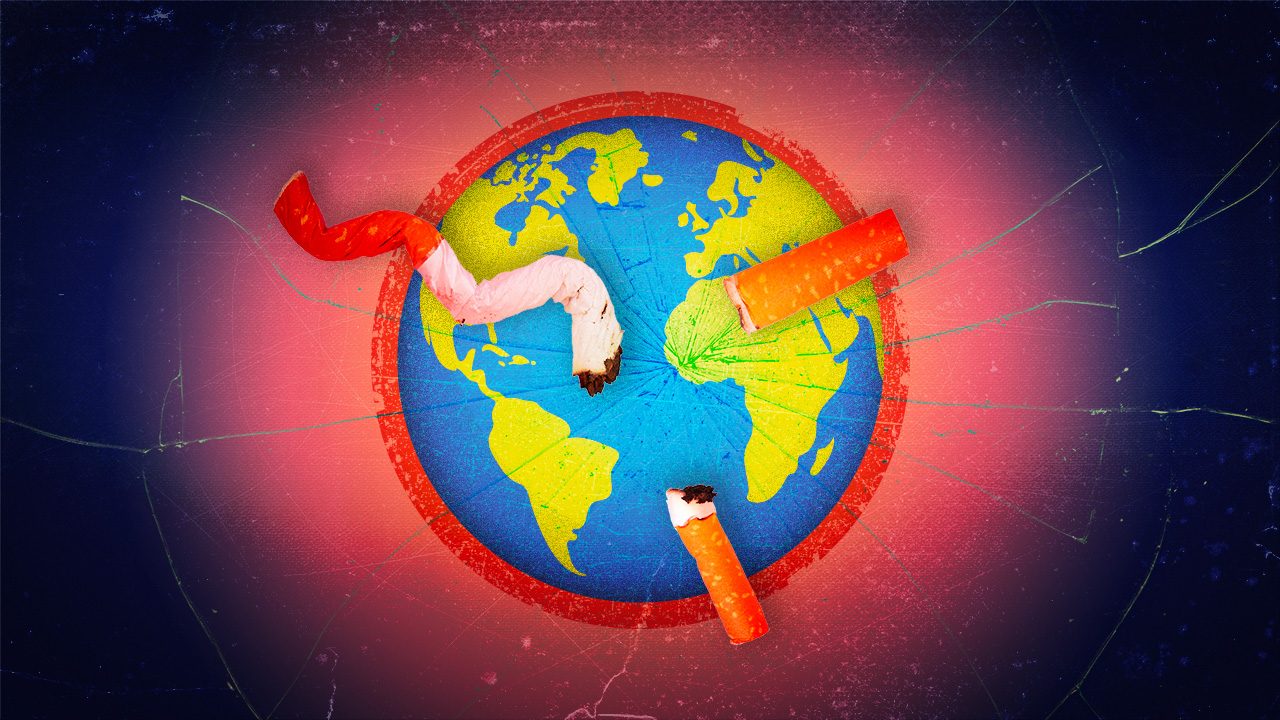
MANILA, Philippines – For years, plastics have had a chokehold on the world’s oceans.
Leading among the most common marine plastic polluters is a toxic little thing that continues to escape waste collection systems the world over: the cigarette butt.
Meant to reduce the harm of smoking, cigarette butts or cigarette filters are attached to nearly all commercial cigarettes. But, according to the World Health Organization (WHO), there is no evidence that these filters have any proven health benefits.
What’s more, they are mainly composed of microplastics called cellulose acetate fibers that leak into the environment. The United Nations (UN) said these butts account for more than 766 million kilograms of toxic trash each year, while roughly 4.5 trillion filters pollute oceans, rivers, sidewalks, parks, and soil each year.
In recent years, the Philippines earned a reputation as a top plastic polluter, with a 2020 study saying the country “has been contributing a substantial volume of plastic debris into the marine ecosystem.” Coastal cleanup data from 2017 showed cigarette butts were the top two items collected from beaches and waterways in the country.
The WHO said one way to address the environmental harms of the tobacco industry is to introduce extended producer responsibility (EPR) schemes, where producers – not consumers – bear the burden of cleaning up their mess.
The Philippines already has an almost one-year-old EPR law, but it’s a measure that requires large companies to recover the plastic packaging waste they produce and excludes cigarette waste from the picture.
The Extended Producer Responsibility Act or Republic Act No. 11898 was the first amendment to the country’s 22-year-old Ecological Solid Waste Management Act, but advocates say it missed the opportunity to address the problem of cigarette filters as a plastic polluter.
‘Little effect’
The EPR bill, crafted by the 18th Congress under the Duterte administration, lapsed into law on July 23, 2022 – just weeks into the Marcos administration.
Prior to the law lapsing, green groups had called on President Ferdinand Marcos Jr. to veto the measure for its limitations in curbing the use of plastics and other wastes, and its possible promotion of incineration.

Among them was marine conservation group Oceana Philippines, which told Rappler they had seen the law to have “little effect” since its passage because of the government’s slow implementation, on top of its many limitations.
The law mandates large enterprises to come up with their EPR program and register it with the government – specifically the National Solid Waste Commission under the environment department – and they must do so within six months of the law’s effectivity or face fines.
“Based on the latest information from the DENR (Department of Environment and Natural Resources), only 600 of the 4,000 covered companies have registered. So there’s really a big gap. We’ve seen for now that even though the provisions are mandatory, it has not been followed strictly,” Oceana legal and policy director Liza Osorio said in a mix of English and Filipino.
Environment Secretary Toni Yulo-Loyzaga admitted there was still a need to push for the EPR law’s implementation.
“There will be a big launch in August [2023] because medyo mahina po ‘yung registration ng mga obliged enterprises po natin (because there is not enough registration of our obliged enterprises),” Loyzaga told Rappler on June 27.
Not just butts
For Dr. Ulysses Dorotheo, executive director of the Southeast Asia Tobacco Control Alliance (SEATCA), even though the EPR law does not include cigarette filters, it should still apply to the tobacco industry since cigarettes are packaged in plastic wrap.
“All the individual packs are wrapped in plastic. If there’s a ream, carton, it’s also wrapped in plastic, so maraming plastic ‘yun (so that’s a lot of plastic),” he told Rappler.
But while the EPR exists, Dorotheo still thinks an explicit ban on cigarette filters is the best solution to this growing environmental problem. For him, tobacco companies could even use the EPR as a “corporate social responsibility opportunity” to do the bare minimum.
“The industry really needs to be held responsible for the way it produces and disposes of its products. The only risk, I think, is tobacco companies are very good with the spin. So, they can use this to their advantage and say if they’re doing it, sure, they might do something about plastic wrap – that’s really the least they can do. But the main issue, which is cigarette filters, hindi nila gagalawin ‘yan (they won’t do something about that),” the tobacco control advocate explained.
The good news is that nations are currently negotiating to create a legally binding global plastic pollution treaty by 2024, and there, cigarette filters seem to be part of the conversation. The UN on March 2, 2022, approved the landmark agreement that started the negotiations, and delegates – including the Philippines – have already met twice in the past year, with a third meeting set for November 2023.
Dorotheo said that with the plastics treaty there’s a “common understanding” between tobacco control advocates and environmental advocates to ban cigarette filters, calling these a “low-hanging fruit.”
SEATCA is part of the Stop Tobacco Pollution Alliance (STPA), which is closely monitoring the negotiations.
STPA member African Tobacco Control Alliance addressed the second negotiating session last May to point out that cigarette filters were “a type of highly toxic plastic with no safe and environmentally sustainable substitute,” adding that “there is simply no reason for the existence of this type of plastic.”
“They are the most littered plastic in terms of trash. And not only that, since it goes into the environment, there’s toxicity to plants, to water, to marine life, to bird life, and it decomposes into microplastics, which will be there for decades, so it’s both the plastic and the toxicity,” Dorotheo said.
With no global plastics treaty yet and a limited EPR law that doesn’t cover cigarette filters, how can the Philippines deal with this toxic problem?
Osorio, an environmental lawyer, said it’s never too early to revisit the EPR law, since there is a mandate that the law be reviewed within five years after effectivity “or as the need arises.”
“This is a law that targets private corporations, which is something new in our country. But we have seen the loopholes of this law,” she said.
“The problem, for instance, on cigarette butts as a plastic polluter, which this law seems to have missed, right? It was a missed opportunity for this law to address…. Since this law deals with behavior of companies or companies’ responsibility to deal with the problem of plastic pollution, it should have been there from the start itself.”
Vapes, too
Aside from cigarette filters, another tobacco product on the rise – especially among the youth – that also threatens the environment are electronic smoking devices, also known as e-cigarettes or vapes.
The 2019 Global Youth Tobacco Survey showed that the number of young people in the Philippines who had ever used e-cigarettes rose to 24.6% in 2019 – more than double the 11.7% in 2015. It also showed that 14.1% of Filipino youths were current e-cigarette users.
Osorio said that unlike cigarette filters, they have not received many reports from their partner communities of vapes ending up on shores. She attributed this to a “lack of awareness” of these products touted as alternatives to cigarettes and promoted for smoking cessation.
For Dorotheo, however, the reason could be because the vape problem is “hindi pa ganung kalala (not yet that bad)” in the Philippines compared to other countries like the United Kingdom or the United States, where disposable e-cigarettes are already commonplace.
In any case, disposable and reusable e-cigarettes both contain plastic, and Dorotheo said that without a single-use plastics ban, it’s just a matter of time before more vapes end up on shores.
What’s worse for the environment is that electronic smoking devices comprise not just one but three forms of waste: plastic waste, electronic waste, and hazardous chemical waste.
Coincidentally, the law that regulates vapes in the Philippines lapsed into law just two days after the EPR measure also lapsed into law.
Dubbed then as an “anti-health” measure, the Vaporized Nicotine Products Regulation Act was so controversial that then president Rodrigo Duterte’s own education and health departments had asked him to veto it.
The Department of Education was concerned about the law lowering access to vapes from 21 years old to 18 years old, since at least 870,000 basic education students are aged 18, while some 1.1 million students in senior high school are aged 18 to 20.
The Department of Health, meanwhile, said the measure was “retrogressive and contains several provisions that contradict public health goals and international standards.”
“If you look at the bigger picture, it’s actually a step backward. I don’t know, it’s very hard to put the genie back in the bottle, it’s been out already, and if you go out, you can see young people, poor people vaping,” Dorotheo said, pointing out that this law, like the EPR, must be amended as it is “too lenient.”
“But I don’t know if there’s any appetite for doing that just yet. It’s been only a year. But then, everything is possible, because the Congress that passed this vape law is the same Congress that passed the sin tax law that raised the age, banned flavors, gave the [Food and Drug Administration] authority, so who knows?” he added.
An environmental issue
With no real local solutions yet to the growing problem of tobacco waste, advocates are looking to the global plastics treaty that’s due in 2024.
While Osorio was not optimistic about the negotiations’ two-year deadline, she acknowledged the need for this treaty since the country’s problem with single-use plastics – including cigarette filters – had a
“transboundary effect.”
“It’s a good step towards the right direction that we have no choice but to support because this is a global problem that we’re dealing with. It’s not [just] a local problem – it’s a global problem that requires not only local solutions but global [solutions],” she added.
Nations are already talking about it; it’s high time the Philippines also treat smoking and vaping not just as a health issue but also as an environmental issue that needs more attention and solutions. – with a report from Bea Cupin/Rappler.com
Add a comment
How does this make you feel?
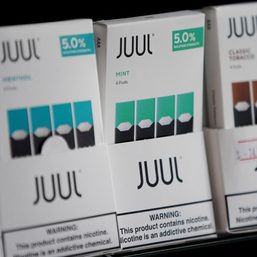
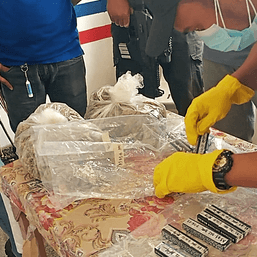
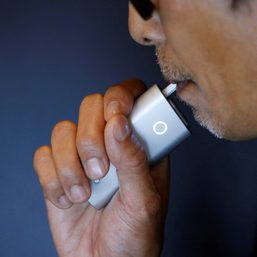
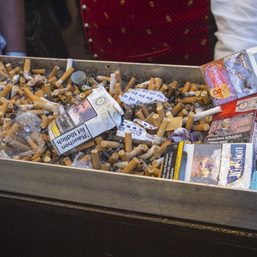








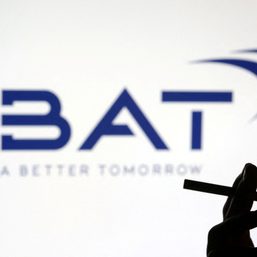
There are no comments yet. Add your comment to start the conversation.